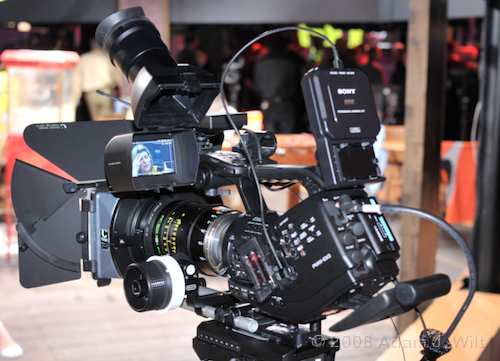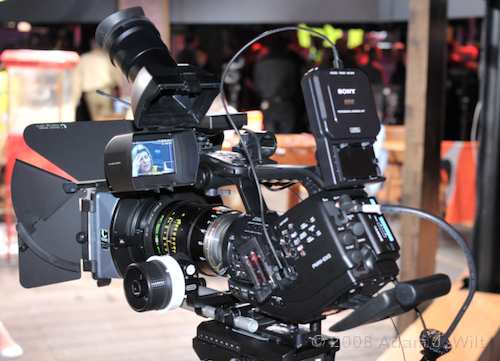
PMW-EX3 with 2/3″ cine lens, Sony HDD recorder
Sony’s Juan Martinez gave me a night-before-the-show tour of the Sony booth (really a miniature city; “booth” doesn’t do it justice), and here are some of the highlights from a camera operator’s perspective.
PMW-EX3
The EX3 will be to the EX1 what the HDV S270 is to the Z7: a higher-end variant using the same basic imager and architecture.
- 3 half-inch CMOS chips with true 1920×1080 resolution; XDCAM HD EX recording on dual SxS cards.
- “Chainsaw” form factor, similar to Canon’s removable-lens DV and HDV camcorders.
- Interchangeable lenses (the camera comes with a removable version of the EX1’s Fujinon 14x, using a new “wide mouth” mount. Into the wide mouth mount you can fit 1/2″ or 2/3″ mount adapters, complete with hot-shoe lens connectors, as well as EX3 wide mouth mount lenses. The wide mouth allows fitting 1/2″ and 2/3″ adapters with no change in flange depth; it’s really a “mount for lens adapters” as much as it’s a “mount for lenses”).
- TC in, TC out, Genlock, Remote-panel port, HD-SDI, dedicated composite (BNC) and Y/C (S-video) ports, along with the usual USB and 4-pin i.LINK and mini-D-shell component ports.
- Some of the prototypes are showing a vertical “head brace” that works with the shoulder brace to register the camera against your body. The combo makes for a much nicer handholding experience than the EX1 offers. The head brace may or may not make it into production.
- Gorgeous EVF. The EX1’s LCD has been encapsulated in an articulated EVF housing (it adjusts side to side, up and down, and back to front) with a flip-up eyepiece. Magnification is excellent—you’re not peering at a tiny image, but watching a BIG screen, which makes focusing easier and more certain.
- Optional 60GB disk recorder that plugs in via an SxS slot. Remember the Specialized Communications that plugged into a P2 slot? Same idea.
- Same 1920×1080 1/2″ Exmor CMOS imagers.
- Price: “Under $13,000” with stock 14x lens.
- Shipping: later this year.
PMW-EX3 with standard 14x lens
Note the “head brace” sticking out the back, and the extendable shoulder pad
close-up of left-side controls; there’s a “frame” dial to set frame rate (no in-shot ramping, though; gotta save something for the F23 and F35!)
The front of the EVF has a real, honest-to-goodness variable peaking control
One of the remote panels that the EX3 works with
The HDD unit with SxS “connector” on a thin cable
Another view of an EX3 with a 2/3″ cine lens
Next: there was more than just the EX3 on display…
PDW-700
The 50Mbit/sec, 4:2:2 variant of XDCAM. Sony is showing it with a dockable DVB/ASI encoder for ENG featuring low latency and tweakable bit-rates (18 Mbit for robust multipath work; 25 Mbit or higher where line-of-sight paths are available; and with a dockable SxS recorder to supplement its on-board XDCAM disc recorder.
Sony also demoed a UK-developed WiFi link to integrate newsroom systems with field production. The newsroom can create a slug in an iNews or ENPS rundown; a reporter can call up the slug and its metadata on his mobile phone. The reporter can dump this info to the PDW-700 via a WiFi adapter; the camera then sets up the next batch of shots with the slug’s name embedded, e.g., if the slug is called “froggy” then the camera will record clips names froggy_001, froggy_002, etc. until it’s given new data to work with.
Even better: the reporter can view proxies created by the camera on a media browser on his phone. Proxies are available within a few seconds of being shot; they can even be streamed live over WiFi (with about a five-second delay) while the camera operator is still shooting them, so the reporter can mark events, tag NG shots, and add logging notes in real time. All this metadata can then be sent back to the newsroom, so that as soon as the footage arrives back in house, it’s already tagged (thus searchable and retrievable as soon as it hits the server) and ready for cutting.
The phone interface looks a bit fiddly for rough-and-tumble work (too many small targets to tap on a tiny Windows Mobile screen), but it’s been in development with a number of UK and US broadcasters for the past year, so who am I to judge?
- PDW-700 price: about $38,000 (IIRC), less lens and viewfinder
- Shipping: in a month or two.
PDW-700 with DVB/ASI transmitter unit
Other XDCAM improvements
- The 500GB data partition size limit on XDCAM disks can now be expanded.
- The next version of the XDCAM Clip Browser can rewrap EX clips in MFX wrappers; transcode OP1a clips to OP-atom (for Avid), and/or generate h.264 and/or DV proxies.
- PMW-EX30 SxS deck with two SxS card slots, a front-panel display, and the ability to record baseband inputs as XDCAM. Price TBD.
Prototype EX30 with the dust of booth construction upon it
F35 (new) and F23 (improved)
The F35 is a single-sensor, 35mm-format digital cinema camera—basically the same package and interface as the F23, but set up for 35mm PL-mount lenses. The single CCD sensor yields 1920×1080 resolution using 5760 (h) x 2160 (v) photosites: triply oversampled horizontally for the separate R,G,B signals, and doubly-scanned. Careful microlens and OLPF design prevents color artifacts on vertical edges. Shallow depth-of-field with no adapters necessary!
F35. Looks just like an F23, except for the fatter lens
The F35 and F23 (with a firmware upgrade) can use a new Arri remote control to set up and operate camera parameters, including both manual and programmed speed ramps. The F23 can ramp all the way to 60p, while the F35 can “only” go to 50p due to the greater number of photosites on the CCD, which makes high-speed readout “challenging”.
Arri remote for live speed ramping (among other things)
One F23 shows off a new optical link, allowing the SRW-1 deck to be remotely placed while the camera maintains all the advanced functionality that previously required the deck to be docked.
F23’s new optical link
The F35 will ship later this year. Price has not been determined; it’ll be higher than the F23’s.
42″ BVM display
A 42″ broadcast-quality LCD display. Price: TBD. Juan says, “Figure a thousand dollars an inch!” Sony is positioning it for color-critical evaluation monitoring. Looked pretty sweet; I’d show you a picture, but (a) I didn’t take one, and (b) you can’t evaluate monitors on a web page anyway: it just looks like a box with a picture on it. All I can say is that pictures looked very nice and the blacks were satisfyingly deep.
1080p60 production switcher
A technology demo of a full-up 1080p60 production switcher. It uses dual-link HD-SDI now; by 2010 it’ll use 3 Gigabit HD-SDI.
Yes, it’s really this blue… in the booth’s lighting, at least.
OLED EVF
I’ll have to come back when the show is open to see this broadcast camera’s OLED viewfinder in operation.
More over the next few days as the show opens and there are other fascinating things to see…

